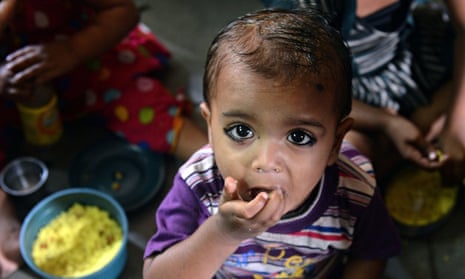More than 2 billion people are malnourished because they do not receive enough nutrition from the food they eat, even though access to food has improved substantially over the past two decades.
Widespread consumption of poor-quality food leads to “hidden hunger”, which ravages economies and worsens poverty, according to the 2014 global hunger index (GHI), released on Monday by the International Food Policy Research Institute (IFPRI), Welthungerhilfe and Concern Worldwide.
“In the long term, people cannot break out of the vicious cycle of poverty and malnutrition without being granted the basic right to nutritious food,” the Welthungerhilfe president, Bärbel Dieckmann, said.
This year’s GHI, which examines 120 low-income countries, says about 805 million people are “chronically undernourished” because they do not receive enough food.
The study shows, however, that 26 countries in the developing world have reduced the number of hungry people by 50% or more since 1990, contributing to a global 39% fall in the number of people without access to food.
Burundi and Eritrea are the countries of most concern, with an “extremely alarming” prevalence of hunger, and the number of hungry people in 14 other countries was described as “alarming”.
The sustainable development goals (SDGs), which will follow the millennium development goals after they expire next year, must incorporate “a universal goal to end hunger and malnutrition in all its forms and clear mechanisms to ensure accountability”, the report says. The latest draft of the SDGs contains a goal to end hunger, achieve food security and improved nutrition, and promote sustainable agriculture.
According to the index, “hidden hunger weakens the immune system, stunts physical and intellectual growth, and can lead to death. It wreaks economic havoc as well, locking countries into cycles of poor nutrition, lost productivity, poverty and reduced economic growth.”
The report’s authors say that diversifying crops, fortifying commercial foods and boosting the micronutrient content of foods would drive hidden hunger down. But they cautioned that long-term gains would only be achieved through a coordination “across the range of ministries and at lower levels, including between health workers and agriculture extension services”.
Hidden hunger can result in vitamin A deficiencies, anaemia and a lack of iodine in children who eat from less than four food groups, the index showed.
“Governments and multilateral institutions need to invest in and develop human and financial resources, increase coordination and ensure transparent monitoring and evaluation to build capacity on nutrition,” the report says.
Shenggen Fan, IFPRI’s director general, said: “The GHI shows that hunger has been decreasing since 1990, but there is much more to be done to address hunger – including hidden hunger – to ensure food and nutrition security for the most vulnerable.”






